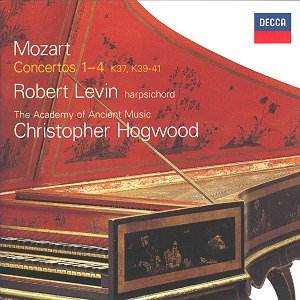Wolfgang Amadeus Mozart (1756 - 1791)
Concertos 1-4 K37, K39-41
Concerto no. 1 in F major, K37 [16.48]
Concerto no. 2 in B flat major, K39 [16.52]
Concerto no. 3 in D major, K40 [13.27]
Concerto no. 4 in G major, K41 [12.40]
 Robert Levin, harpsichord
Robert Levin, harpsichord
The Academy of Ancient Music, Christopher Hogwood
Rec: October 1998, London
 DECCA 466 - 131-2
[60.12]
DECCA 466 - 131-2
[60.12]
Crotchet AmazonUK
AmazonUS
Amazon
recommendations

When Mozart was 11 years old, after having conducted a lengthy tour of Europe,
he set out with his father, to write arrangements of keyboard concerto movements
by Raupach, Honauer, Schobert and Eckard. It is likely that these were his
first attempts at 'writing' concertos, and these pasticcio concertos
may represent the core material that helped Mozart come to grips with the
concerto form.
While this disc actually contains music transcribed and arranged by Mozart
(and his father), and not written by him, it is interesting for several reasons.
These keyboard concertos, a mixture of arrangements of movements by the four
composers mentioned above (with one movement after C.P.E. Bach, and one that
might have been written by Mozart himself), represent not only Mozart's first
attempt at writing concertos, but also vehicles designed to show off his
virtuosity. The keyboard scores for these works are complex and demanding,
calling for the most skilful performer. While musically they do not rank
among Mozart's greatest works, it is interesting to hear the intermediate
stage that lay between the composers who influenced his work and his own,
later creations.
The four keyboard concertos here do not stand out for their exceptional musical
qualities; they are little more than 'nice' music that is agreeable to listen
to. However, the virtuosity of the works makes them worth a listen for the
keyboard technique alone. Unfortunately, the recording is marred by an uneven
balance between the harpsichord and orchestra. It can be difficult to record
harpsichord concertos, and, here, the harpsichord is often drowned out by
the orchestra, except during solo passages.
This disc is unique for many reasons. Robert Levin, an extremely gifted and
talented keyboard player (who plays harpsichord, piano, organ and clavichord
with equal levels of skill - his excellent recording of Bach's Well-Tempered
Clavier for Haenssler features a mixture of these four instruments), chose
to play these concertos on the harpsichord, because Mozart is not known to
have given performances on the piano at the time he and his father prepared
the pasticcio concertos. This is a welcome change from most Mozart
recordings, which assume that he played all his works on piano (or pianoforte).
Also, a certain amount of improvisation is used - all embellishments and
cadenzas were improvised, which is how this music was played in its time.
The recording was also made at a pitch of a=430, which would be difficult
with a modern piano.
An interesting recording of Mozart's earliest arrangements of keyboard concertos.
Slightly marred by the harpsichord being drowned out by the orchestra, this
disc is nevertheless a valuable addition to the collection of anyone interested
in understanding Mozart's influences and earliest works.
Kirk McElhearn

